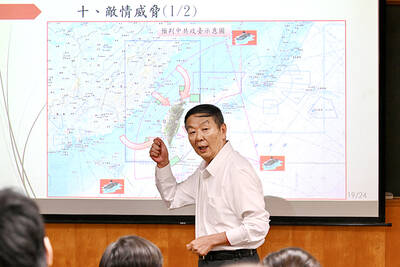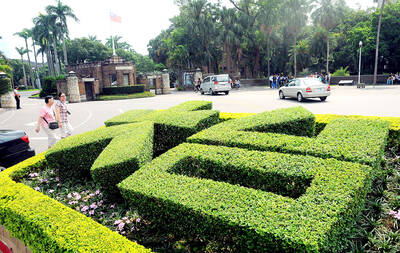President Chen Shui-bian (
Speaking at a financial reform seminar sponsored by the Taiwan Thinktank (

PHOTO: LIAO CHENG-HUEI, TAIPEI TIMES
In addition the government will remove restrictions requiring QFII's to remit money into Taiwan within two years of their stock investment application approval, Chen said. An official at the Securities and Futures Commission said the changes are expected to take place within days.
QFIIs include foreign banks, insurance companies, fund management institutions, securities firms and funds operated by foreign governments.
"The government is determined to speed up economic liberalization. Hopefully Taiwan will become more accessible to international investment and the local market will be able to go forward at the same pace as its foreign counterparts," Chen said.
In response to Chen's remarks, the TAIEX surged 170.41, or 3.3 percent, to close at 5,322.26 on optimism overseas investors will buy more local shares. Risers led decliners 473 to 180, with 89 stocks unchanged. Turnover was NT$170.47 billion (US$4.96 billion).
Analysts said Chen may be trying to stir up a stock rally ahead of the presidential election next March and may be aiming to strengthen Taiwan's position against China, which is opening its yuan-denominated market to foreign funds for the first time this month.
"President Chen understands that a bullish stock market is good for the investors' pockets," said Phil Chen (
"A deeper pocket will boost consumer spending and the economy, which will help Chen in his re-election bid," he said.
Overseas institutions had a combined US$47.7 billion invested in Taiwan shares as of June 20, according to the Securities and Futures Commission, under the Ministry of Finance. Foreign funds account for about 10 percent of Taiwan's market capitalization.
"Foreign investors were the major supporter of Taiwan stocks when concerns of the Iraq war and SARS scared local investors into dumping shares earlier this year," said Jerry Chen (
Foreign funds will still have to seek approval from Taiwan's central bank and declare the amount they intend to invest. Meanwhile, Chinese capital, which is inextricably linked with cross-strait policies, and international hedge funds, which may impact Taiwan's foreign exchange market operations, will still be barred from entering the country, Wu Tang-chieh (
Vice Minister of Finance Susan Chang (

RETHINK? The defense ministry and Navy Command Headquarters could take over the indigenous submarine project and change its production timeline, a source said Admiral Huang Shu-kuang’s (黃曙光) resignation as head of the Indigenous Submarine Program and as a member of the National Security Council could affect the production of submarines, a source said yesterday. Huang in a statement last night said he had decided to resign due to national security concerns while expressing the hope that it would put a stop to political wrangling that only undermines the advancement of the nation’s defense capabilities. Taiwan People’s Party Legislator Vivian Huang (黃珊珊) yesterday said that the admiral, her older brother, felt it was time for him to step down and that he had completed what he

Taiwan has experienced its most significant improvement in the QS World University Rankings by Subject, data provided on Sunday by international higher education analyst Quacquarelli Symonds (QS) showed. Compared with last year’s edition of the rankings, which measure academic excellence and influence, Taiwanese universities made great improvements in the H Index metric, which evaluates research productivity and its impact, with a notable 30 percent increase overall, QS said. Taiwanese universities also made notable progress in the Citations per Paper metric, which measures the impact of research, achieving a 13 percent increase. Taiwanese universities gained 10 percent in Academic Reputation, but declined 18 percent

CHINA REACTS: The patrol and reconnaissance plane ‘transited the Taiwan Strait in international airspace,’ the 7th Fleet said, while Taipei said it saw nothing unusual The US 7th Fleet yesterday said that a US Navy P-8A Poseidon flew through the Taiwan Strait, a day after US and Chinese defense heads held their first talks since November 2022 in an effort to reduce regional tensions. The patrol and reconnaissance plane “transited the Taiwan Strait in international airspace,” the 7th Fleet said in a news release. “By operating within the Taiwan Strait in accordance with international law, the United States upholds the navigational rights and freedoms of all nations.” In a separate statement, the Ministry of National Defense said that it monitored nearby waters and airspace as the aircraft

UNDER DISCUSSION: The combatant command would integrate fast attack boat and anti-ship missile groups to defend waters closest to the coastline, a source said The military could establish a new combatant command as early as 2026, which would be tasked with defending Taiwan’s territorial waters 24 nautical miles (44.4km) from the nation’s coastline, a source familiar with the matter said yesterday. The new command, which would fall under the Naval Command Headquarters, would be led by a vice admiral and integrate existing fast attack boat and anti-ship missile groups, along with the Naval Maritime Surveillance and Reconnaissance Command, said the source, who asked to remain anonymous. It could be launched by 2026, but details are being discussed and no final timetable has been announced, the source